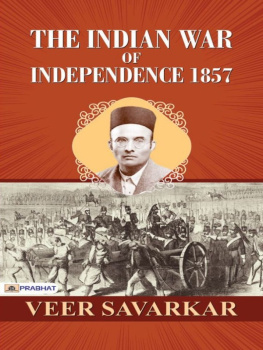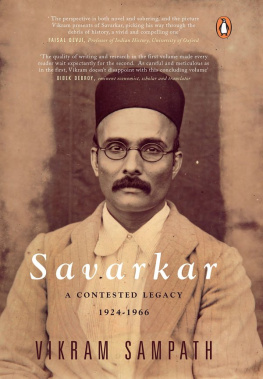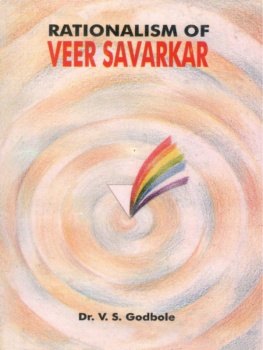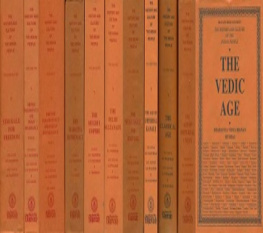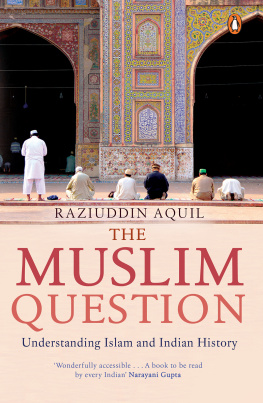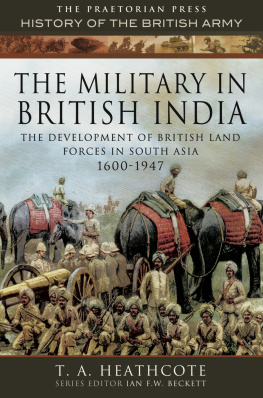SIX GLORIOUS EPOCHS
OF
INDIAN HISTORY
VEER SAVARKAR

Contents
A Word in Confidence
I t is with great pleasure and satisfaction that I present to the readers this translation of the original book in Marathi. I consider it a piece of good luck to have had an opportunity of translating such an important book by the late Swantantrya-Veer V.D. Savarkar, which cropped up in my casual talk with Shree Balarao Savarkar, the devoted private secretary of that Prince of Patriots. After it was translated, every chapter went to the illustrious author who honoured me by going through it very carefully and when I had the good fortune to meet him personally on the completion of the undertaking, he obliged me by saying that he was satisfied with the translation and appreciated the hard labour it entailed. Would that Swa. Veer Savarkar had been alive today to see this English translation of his book in print!
Veer Savarkars book is a commentary, not a history in its academic senseon the significant events and periods in our national life, taking a broad survey of the growth and survival of our Hindu race. In a way, this attempt of Savarkar has been singular, barring a few honourable exceptions.
The general trend of the histories, written, read and taught in schools and colleges, has been one of eulogizing the foreigners and deprecating the Hindu race, relying wholly on the biased records of the foreign historians and travellers. Attempts are, happily, being made to reconstruct and restate the history of India from the national point of view, using to the utmost, all available native records of coins and inscriptions and covert allusions in the otherwise non-historical works, slender though they may be, but they are still sporadic and isolated, relating to this or that particular phase of Indian History. This volume presents Six Glorious Epochs of Indian History since the beginning of our recorded history, i.e. from the days of Chandragupta Maurya to the end of the British dominance over India. Hence, like its predecessor, The War of Indian Independence of 1857, which galvanized the public opinion and changed the world outlook on the phase of our national life, this book too is very likely to start re-orientation of our historical concepts and the accepted historical theories. A need for an English translation of this book was, therefore, surely felt with a view to introducing it to the people who are unable to read or understand Marathi.
A book of this type had to be substantiated with proofs, especially when it was replete with thought-provoking even at times shockingstatements and conclusions. Basic references were, therefore, an unavoidable necessity, but the author, who had already crossed the bar of eighty years, and whose physical ailments had already created insurmountable difficulties in the very writing of this book, could not be expected to stand the rigour of pinpointing his references, voluminous as they were. I, therefore, had to shoulder that responsibility. The appendage of the basic references to this volume is, thus, my humble contribution. They will clearly show to the reader that the facts mentioned in this volume are fully backed by evidence. The interpretation of these facts and the conclusions drawn from them, however, are the authors special privileges, if only, they obey the laws of logical reasoning. The chapters are numbered serially from one to twenty-three. Each paragraph is serially numbered at the beginning.
My thanks are due to my son, Shri P.S. Godbole for going through the typewritten sheets. I am thankful to Shri B.D. Velankar, the Asiatic Society of Bombay and the University of Bombay for library facilities. I am also thankful to the publishers who have brought out this book.
S.T. Godbole
1ST GLORIOUS EPOCH
1.
ChandraguptaChanakya
1. According to modern historical research, the first phase of the dawn of our national life dates back almost to five to ten thousand years ago. Like that of China, Babylon, Greece and other ancient nations, our ancient history, too, is clothed in the poetical garb of mythology. It is replete with anecdotes, folklore, and deification of national heroes and heroines, and resorts to supernatural and symbolic description. Yet these ancient mythologies (Puranas) of ours are the pillars supporting the edifice of our ancient history. Just as these extensive Puranic texts of ours are a magnificent treasure of our ancient literature, our knowledge, our glorious deeds and our grandeur and wealth, in a similar way, they are a vast storehouse of the accounts of our past, desultory, chaotic, even at times, ambiguous though it may be.
2. Our Puranas, however, are not history pure and unadulterated.
3. Hence, I propose to set aside the consideration of the Pauranic times in the present context. For the Glorious Epochs I am going to refer to, and dilate upon, belong not so much to the Pauranic times as to the historic periods of our national life.
The Beginning of Indian History
4. The main criterion of history is that the dates and places and descriptions of events referred to therein must necessarily bear the stamp of authenticity, and that they should be corroborated, as far as possible, by foreign as well as indigenous evidence.
5. The account of our past which fairly stands this test begins approximately from the time of Lord Buddha. Hence, many Indian and Western Orientalists have accepted the Buddhist period as the beginning of Indian history. The incessant and indefatigable labours of these Orientalists may, in future, include some of the so-called Pauranic period into the historical one, if some new evidence were to come to light. Till then, at least, we have to regard the Buddhistic period as the starting point of our history.
6. Again, in respect of establishing the authentic history of any nation beyond doubt, the convincing references in the contemporary literature of other nations are really invaluable. The ancient period of our history which can be supported by the now available, unimpeachable evidence in the historical records of countries other than India is the one that begins round about the times of Emperor Chandragupta Maurya. For, since the date of Alexanders so-called invasion of India, numerous references to events in India are to be found in the historical accounts of the Greek writers and the description of their travels by the Chinese travellers.
7. What should be the criterion for determining the Glorious Epochs I am going to discuss here? For that matter, there are hundreds of glorious epochs in the history of our nation that stand the tests of poetic exuberance, music, prowess, affluence, the height of philosophy and depth of theology and many other criteria. But by the Glorious Epoch, I mean the one from the history of that warlike generation and the brave leaders and successful warriors, who inspire and lead it on to a war of liberation, in order to free their nation from the shackles of foreign domination, whenever it has the misfortune to fall a prey to such powerful fatal aggression and to grovel abjectly under it, and who ultimately drive away the enemy making it an absolutely free and sovereign nation. Every nation extols such epochs of the wars of independence which inflict crushing defeats on the enemy. Take, for instance, the American War of Independence. The day on which America wrenched her independence from England, vanquishing her completely on the battlefield, is a red-letter day in the history of America and is celebtrated like a festival all over the country. The moment recording this successful struggle for freedom is acknowledged as a glorious epoch in the history of America.
Next page


